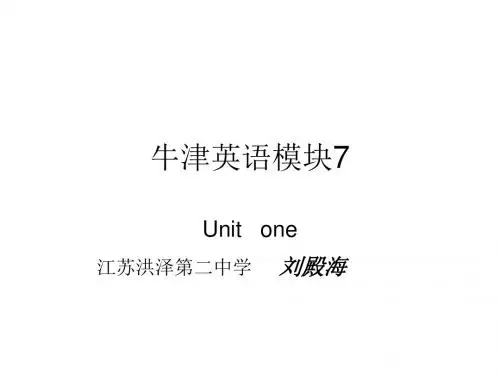牛津高中英语模块七_Unit_1
- 格式:ppt
- 大小:3.77 MB
- 文档页数:67
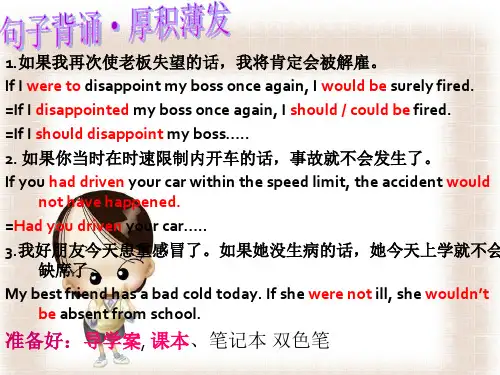
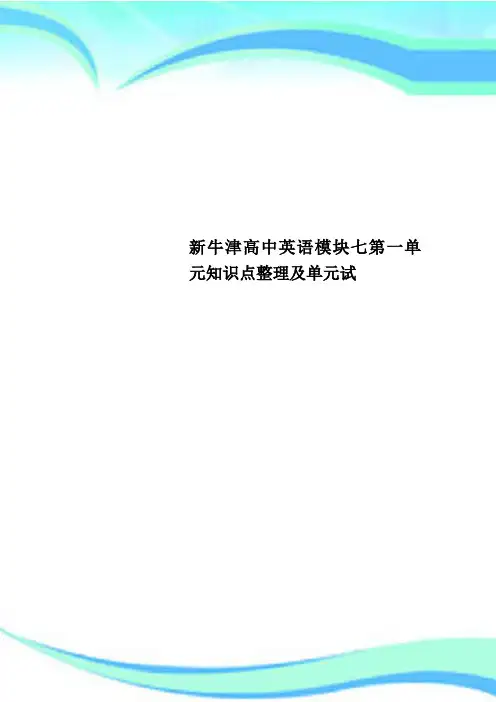
新牛津高中英语模块七第一单元知识点整理及单元试————————————————————————————————作者:————————————————————————————————日期:新牛津高中英语模块七第一单元知识点整理及单元练习M7 UNIT1一、词汇大集合【单词】1. It is still uncertain who invented TV. 至今还未能确定谁发明了电视。
uncertain adj. 不确定的;无把握的;是certain的反义词▲be uncertain about / of sth. 对…不确定/ 没把握They are both uncertain about what to do. 他们两人都拿不定主意该怎么办。
▲It’s uncertain + 主语从句It’s uncertain whether he will come tomorrow. 他明天不一定会来。
2. superior adj. 优秀的;上等的;有优越感的;无比较级 n. 上级;上司▲be superior to 优于;胜过His new computer is technically superior to mine. 他的新电脑在技术上超过了我的。
I’m going to complain to your superiors. 我要找你的上司投诉。
3. wind vt. 上发条;缠;绕; 摇;弯曲前进;迂回;蜿蜒(wound; wound)▲wind up 给…上发条He wound up the toy car and let it go. 他给玩具车上发条然后松手让它跑。
▲wind through 蜿蜒穿过The river winds through the woods. 那条河蜿蜒流过树林。
▲wind one’s way 蜿蜒向前;曲直延伸The Great Wall winds its way over mountains from the west to the east.4. apply vt. / vi. 应用;运用;申请;▲apply sth. to sth. 把…应用于…Scientific discoveries are often applied to industry. 科学发明常运用于工业。
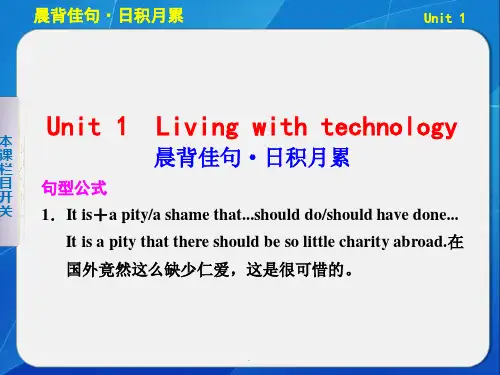
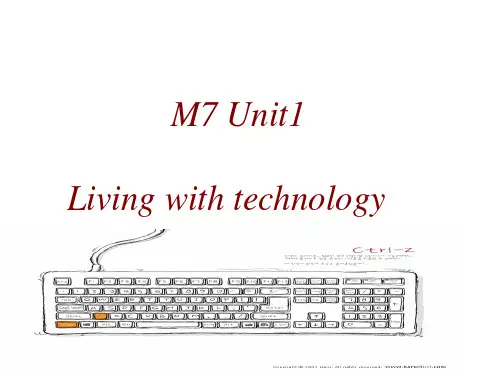
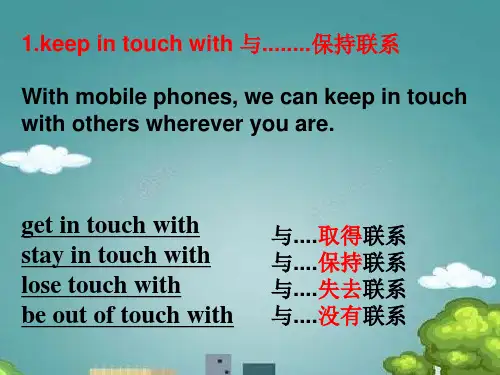
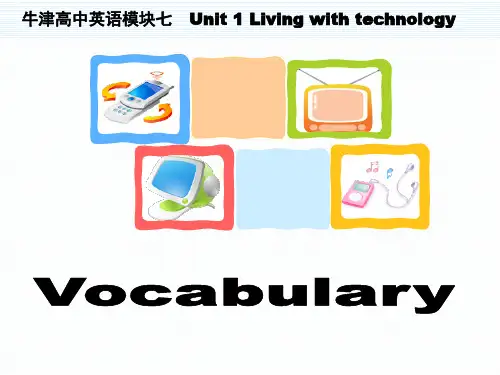
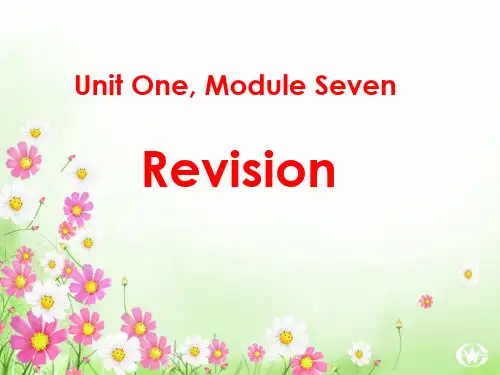
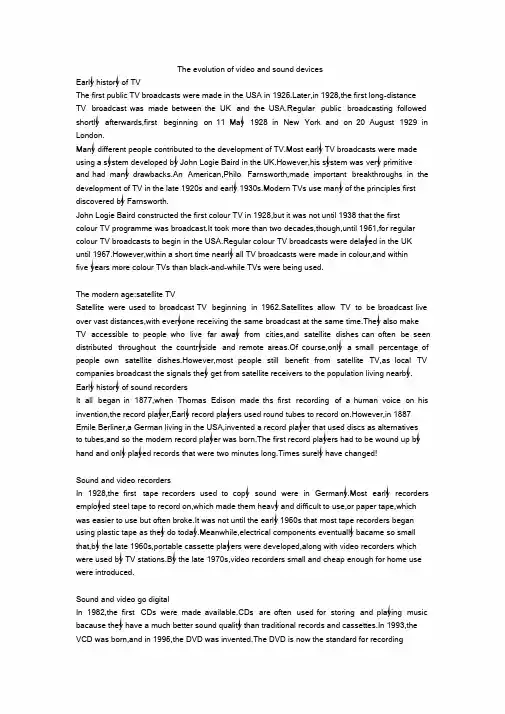
The evolution of video and sound devicesEarly history of TVThe first public TV broadcasts were made in the USA in ter,in 1928,the first long-distanceTV broadcast was made between the UK and the USA.Regular public broadcasting followed shortly afterwards,first beginning on 11 May 1928 in New York and on 20 August 1929 in London.Many different people contributed to the development of TV.Most early TV broadcasts were made using a system developed by John Logie Baird in the UK.However,his system was very primitiveand had many drawbacks.An American,Philo Farnsworth,made important breakthroughs in the development of TV in the late 1920s and early 1930s.Modern TVs use many of the principles first discovered by Farnsworth.John Logie Baird constructed the first colour TV in 1928,but it was not until 1938 that the firstcolour TV programme was broadcast.It took more than two decades,though,until 1951,for regular colour TV broadcasts to begin in the USA.Regular colour TV broadcasts were delayed in the UKuntil 1967.However,within a short time nearly all TV broadcasts were made in colour,and withinfive years more colour TVs than black-and-while TVs were being used.The modern age:satellite TVSatellite were used to broadcast TV beginning in 1962.Satellites allow TV to be broadcast live over vast distances,with everyone receiving the same broadcast at the same time.They also make TV accessible to people who live far away from cities,and satellite dishes can often be seen distributed throughout the countryside and remote areas.Of course,only a small percentage of people own satellite dishes.However,most people still benefit from satellite TV,as local TV companies broadcast the signals they get from satellite receivers to the population living nearby. Early history of sound recordersIt all began in 1877,when Thomas Edison made ths first recording of a human voice on his invention,the record player,Early record players used round tubes to record on.However,in 1887 Emile Berliner,a German living in the USA,invented a record player that used discs as alternativesto tubes,and so the modern record player was born.The first record players had to be wound up by hand and only played records that were two minutes long.Times surely have changed!Sound and video recordersIn 1928,the first tape recorders used to copy sound were in Germany.Most early recorders employed steel tape to record on,which made them heavy and difficult to use,or paper tape,which was easier to use but often broke.It was not until the early 1950s that most tape recorders began using plastic tape as they do today.Meanwhile,electrical components eventually bacame so small that,by the late 1960s,portable cassette players were developed,along with video recorders which were used by TV stations.By the late 1970s,video recorders small and cheap enough for home use were introduced.Sound and video go digitalIn 1982,the first CDs were made available.CDs are often used for storing and playing music bacause they have a much better sound quality than traditional records and cassettes.In 1993,the VCD was born,and in 1995,the DVD was invented.The DVD is now the standard for recordingand playing back video.The future With the development of digital technology,sound and video can now be stored on a PC,on the Internet,or using some form of portable storage.This will soon make records,cassette recorders,CDs,DVDs and even TVs things of the past.Technology is now changing faster than most people can keep pace with.Who can foresee what the future will bring?。
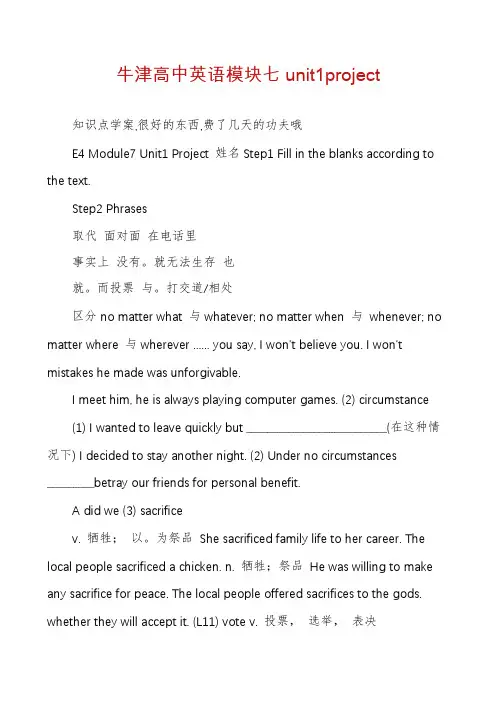
牛津高中英语模块七unit1project知识点学案,很好的东西,费了几天的功夫哦E4 Module7 Unit1 Project 姓名Step1 Fill in the blanks according to the text.Step2 Phrases取代面对面在电话里事实上没有。
就无法生存也就。
而投票与。
打交道/相处区分no matter what 与whatever; no matter when 与whenever; no matter where 与wherever ...... you say, I won’t believe you. I won’t mistakes he made was unforgivable.I meet him, he is always playing computer games. (2) circumstance(1) I wanted to leave quickly but ___________________________(在这种情况下) I decided to stay another night. (2) Under no circumstances_________betray our friends for personal benefit.A did we (3) sacrificev. 牺牲;以。
为祭品She sacrificed family life to her career. The local people sacrificed a chicken. n. 牺牲;祭品He was willing to make any sacrifice for peace. The local people offered sacrifices to the gods. whether they will accept it. (L11) vote v. 投票,选举,表决Since we can’t reach an agreement, then let’s vote on this problem. vote n. 选票,选举There were 21 votes for and 17 against the plan. The issue was put to the vote. She obtained 40% of the vote. People get the vote at 18.where everyone lives close together 在句子中充当reject v.拒绝一个礼物/ 建议/ 被一所大学拒绝接纳After the transplant his body rejected the new heart.telephones in their houses.(L21)句中since引导___________ 从句。
